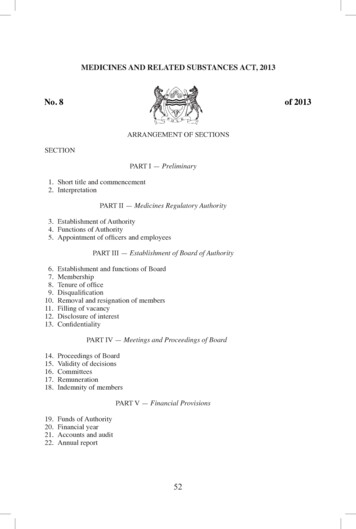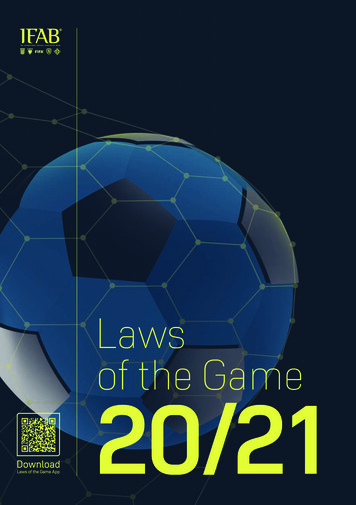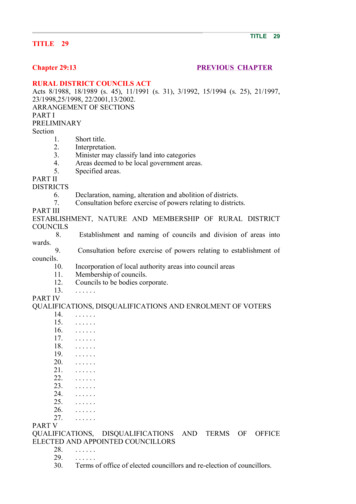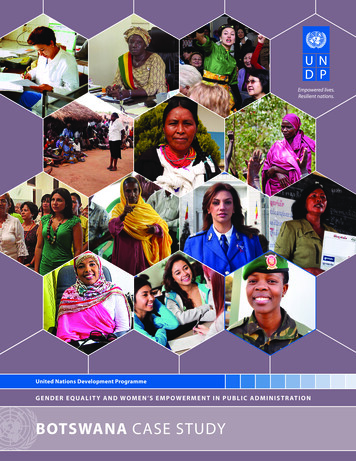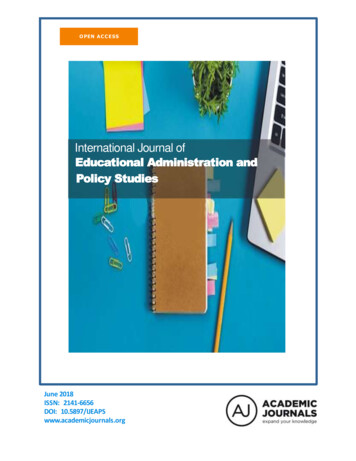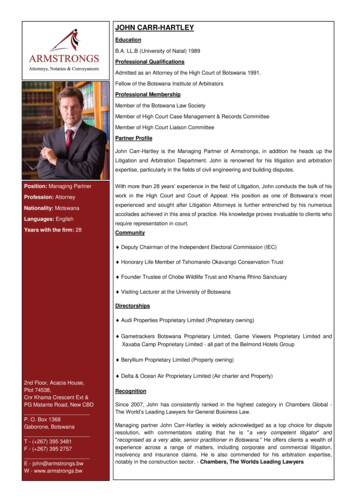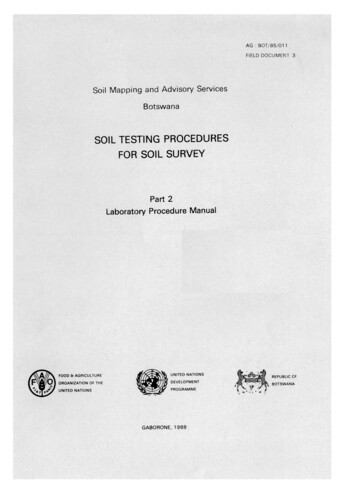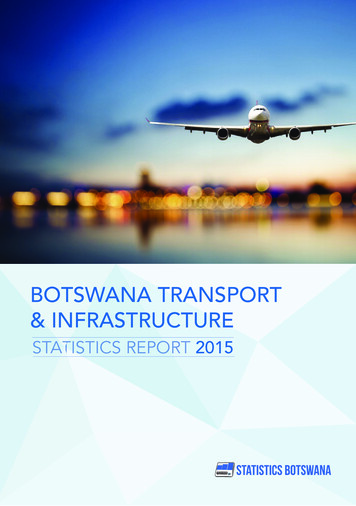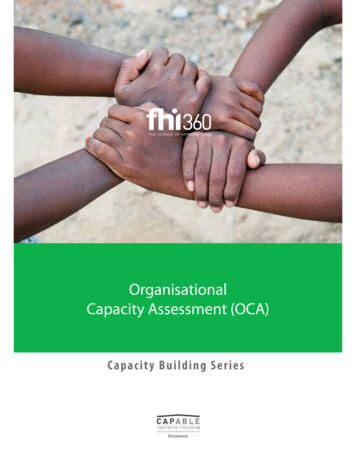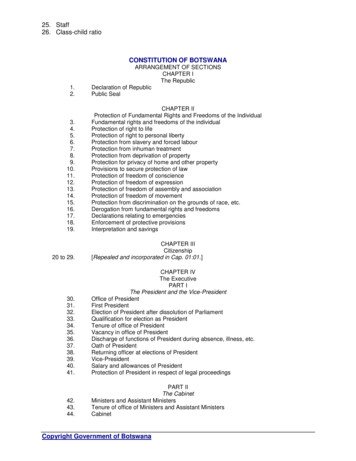
Transcription
25. Staff26. Class-child ratioCONSTITUTION OF 18.19.20 to 29.ARRANGEMENT OF SECTIONSCHAPTER IThe RepublicDeclaration of RepublicPublic SealCHAPTER IIProtection of Fundamental Rights and Freedoms of the IndividualFundamental rights and freedoms of the individualProtection of right to lifeProtection of right to personal libertyProtection from slavery and forced labourProtection from inhuman treatmentProtection from deprivation of propertyProtection for privacy of home and other propertyProvisions to secure protection of lawProtection of freedom of conscienceProtection of freedom of expressionProtection of freedom of assembly and associationProtection of freedom of movementProtection from discrimination on the grounds of race, etc.Derogation from fundamental rights and freedomsDeclarations relating to emergenciesEnforcement of protective provisionsInterpretation and savingsCHAPTER IIICitizenship[Repealed and incorporated in Cap. 01:01.]30.31.32.33.34.35.36.37.38.39.40.41.CHAPTER IVThe ExecutivePART IThe President and the Vice-PresidentOffice of PresidentFirst PresidentElection of President after dissolution of ParliamentQualification for election as PresidentTenure of office of PresidentVacancy in office of PresidentDischarge of functions of President during absence, illness, etc.Oath of PresidentReturning officer at elections of PresidentVice-PresidentSalary and allowances of PresidentProtection of President in respect of legal proceedings42.43.44.PART IIThe CabinetMinisters and Assistant MinistersTenure of office of Ministers and Assistant MinistersCabinetCopyright Government of Botswana
25. Staff26. Class-child ratio45.46.Oaths to be taken by Ministers and Assistant MinistersSecretary to the CabinetPART IIIExecutive ns of PresidentCommand of armed forcesFunctions of Vice-PresidentFunctions of Cabinet Ministers and Assistant MinistersAttorney-GeneralDirector of Public ProsecutionsPermanent SecretariesPrerogative of MercyAdvisory Committee on Prerogative of MercyFunctions of Advisory Committee on Prerogative of MercyConstitution of officesCHAPTER VParliamentPART 8.69.70.ParliamentComposition of National AssemblySpeakerDeputy SpeakerQualifications for election to National AssemblyDisqualifications for membership of National AssemblyConstituenciesDelimitation CommissionReport of CommissionAppointment of Independent Electoral CommissionAppointment of Secretary to Independent Electoral CommissionThe franchiseTenure of office of membersDetermination of questions as to membership of National AssemblyClerk of the Assembly71.72.73.74.75.76.PART IIGeneral Provisions Relating to Procedure in National AssemblyOaths to be taken by Speaker and MembersPresiding in AssemblyQuorum in AssemblyVoting in AssemblyUnqualified persons sitting or votingRegulation of procedure in Assembly77.78.79.80.81.PART IIINtlo ya DikgosiEstablishment and composition of Ntlo ya DikgosiDesignation for Member to Ntlo ya DikgosiQualifications for Members of Ntlo ya DikgosiOath of allegianceSecretary to Ntlo ya DikgosiCopyright Government of Botswana
25. Staff26. Class-child ratio82.83.84.85.Tenure of office of Members of Ntlo ya DikgosiRules of Procedure of Ntlo ya DikgosiNtlo ya Dikgosi may transact business notwithstanding vacanciesFunctions of Ntlo ya DikgosiPART IVPowers of Parliament86.87.88.89.Legislative powersMode of exercising legislative powersIntroduction of BillsAlteration of Constitution90.91.92.93.PART VSummoning, Prorogation and DissolutionSessions of ParliamentProrogation and dissolution of ParliamentVote of no confidence in the GovernmentSittings of National Assembly94.PART VIInterpretationVotes of two-thirds of the Assembly95.96.97.98.CHAPTER VIThe JudicaturePART IThe High CourtJurisdiction and compositionAppointment of judges of High CourtTenure of office of judges of High CourtOaths to be taken by judges of High Court99.100.101.102.PART IICourt of AppealComposition and jurisdictionAppointment of judges of Court of AppealTenure of office of judges of Court of AppealOaths to be taken by judges of Court of Appeal103.104.PART IIIJudicial Service CommissionComposition and procedureAppointment, etc., of judicial officers105.106.PART IVInterpretation of the ConstitutionReference to High Court of cases involving interpretation of ConstitutionAppeal to Court of AppealPART VJudicial Committee107.[Repealed.]Copyright Government of Botswana
25. Staff26. Class-child ratio108.109.110.111.112.113.114.115.116.CHAPTER VIIThe Public ServicePower to specify qualifications for certain officesPublic Service CommissionAppointment, etc., of public officersAppeals to PresidentPowers of President in relation to certain public officesTenure of office of Director of Public ProsecutionsTenure of office of Auditor-GeneralPensions laws and protection of pensions rightsPower of Commissions in relation to pensions, etc.CHAPTER dated FundWithdrawals from Consolidated Fund or other public fundsAuthorization of expenditureAuthorization of expenditure in advance of appropriationContingencies FundRemuneration of certain officersPublic debtAuditor-GeneralCHAPTER nts and concurrent appointmentsInterpretationFirst Schedule - Election of Specially Elected Members of the National AssemblySecond Schedule - Division of Districts into regions for the purpose of selectingMembers of Ntlo ya DikgosiL.N. 83, 1966,Act 30, 1969,Act 43, 1969,Act 25, 1970,Act 28, 1972,Act 24, 1973,Act 28, 1978,S.I. 25, 1980,Act 32, 1982,Act 1, 1983,Act 22, 1987,S.I. 37, 1991,Act 27, 1992,S.I. 51, 1993,S.I. 119, 1993,Act 16, 1997,Act 18, 1997,Copyright Government of Botswana
25. Staff26. Class-child ratioAct 1, 1999,Act 2, 2002,Act 12, 2002,Act 9, 2005,S.I. 51, 2005,S.I. 91, 2006.[Date of Commencement: 30th September, 1966]CHAPTER IThe Republic (ss 1-2)1.Declaration of RepublicBotswana is a sovereign Republic.2.Public SealThe Public Seal of the Republic shall be such device as may be prescribed by or under anAct of Parliament.CHAPTER IIProtection of Fundamental Rights and Freedoms of the Individual (ss 3-19)3.Fundamental rights and freedoms of the individualWhereas every person in Botswana is entitled to the fundamental rights and freedoms ofthe individual, that is to say, the right, whatever his or her race, place of origin, political opinions,colour, creed or sex, but subject to respect for the rights and freedoms of others and for the publicinterest to each and all of the following, namely(a) life, liberty, security of the person and the protection of the law;(b) freedom of conscience, of expression and of assembly and association; and(c) protection for the privacy of his or her home and other property and from deprivation ofproperty without compensation,the provisions of this Chapter shall have effect for the purpose of affording protection to thoserights and freedoms subject to such limitations of that protection as are contained in thoseprovisions, being limitations designed to ensure that the enjoyment of the said rights andfreedoms by any individual does not prejudice the rights and freedoms of others or the publicinterest.4.Protection of right to life(1) No person shall be deprived of his or her life intentionally save in execution of thesentence of a court in respect of an offence under the law in force in Botswana of which he or shehas been convicted.(2) A person shall not be regarded as having been deprived of his or her life incontravention of subsection (1) of this section if he or she dies as the result of the use, to suchextent and in such circumstances as are permitted by law, of such force as is reasonablyjustifiable(a) for the defence of any person from violence or for the defence of property;(b) in order to effect a lawful arrest or to prevent the escape of a person lawfully detained;(c) for the purpose of suppressing a riot, insurrection or mutiny; or(d) in order to prevent the commission by that person of a criminal offence,or if he or she dies as the result of a lawful act of war.5.Protection of right to personal liberty(1) No person shall be deprived of his or her personal liberty save as may be authorized bylaw in any of the following cases, that is to say-Copyright Government of Botswana
25. Staff26. Class-child ratio(a)in execution of the sentence or order of a court, whether established for Botswana orsome other country, in respect of a criminal offence of which he or she has beenconvicted;(b) in execution of the order of a court of record punishing him or her for contempt of that oranother court;(c) in execution of the order of a court made to secure the fulfilment of any obligationimposed on him or her by law;(d) for the purpose of bringing him or her before a court in execution of the order of a court;(e) upon reasonable suspicion of his or her having committed, or being about to commit, acriminal offence under the law in force in Botswana;(f)under the order of a court or with the consent of his or her parent or guardian, for his orher education or welfare during any period ending not later than the date when he or sheattains the age of 18 years;(g) for the purpose of preventing the spread of an infectious or contagious disease;(h) in the case of a person who is, or is reasonably suspected to be, of unsound mind,addicted to drugs or alcohol, or a vagrant, for the purpose of his or her care or treatmentor the protection of the community;(i)for the purpose of preventing the unlawful entry of that person into Botswana, or for thepurpose of effecting the expulsion, extradition or other lawful removal of that person fromBotswana, or for the purpose of restricting that person while he or she is being conveyedthrough Botswana in the course of his or her extradition or removal as a convictedprisoner from one country to another;(j)to such extent as may be necessary in the execution of a lawful order requiring thatperson to remain within a specified area within Botswana or prohibiting him or her frombeing within such an area, or to such extent as may be reasonably justifiable for thetaking of proceedings against that person relating to the making of any such order, or tosuch extent as may be reasonably justifiable for restraining that person during any visitthat he or she is permitted to make to any part of Botswana in which, in consequence ofany such order, his or her presence would otherwise be unlawful; or(k) for the purpose of ensuring the safety of aircraft in flight.(2) Any person who is arrested or detained shall be informed as soon as reasonablypracticable, in a language that he or she understands, of the reasons for his or her arrest ordetention.(3) Any person who is arrested or detained(a) for the purpose of bringing him or her before a court in execution of the order of a court;or(b) upon reasonable suspicion of his or her having committed, or being about to commit, acriminal offence under the law in force in Botswana,and who is not released, shall be brought as soon as is reasonably practicable before a court; andif any person arrested or detained as mentioned in paragraph (b) of this subsection is not triedwithin a reasonable time, then, without prejudice to any further proceedings that may be broughtagainst him or her, he or she shall be released either unconditionally or upon reasonableconditions, including in particular such conditions as are reasonably necessary to ensure that heor she appears at a later date for trial or for proceedings preliminary to trial.(4) Any person who is unlawfully arrested or detained by any other person shall be entitledto compensation therefor from that other person.6.Protection from slavery and forced labour(1) No person shall be held in slavery or servitude.(2) No person shall be required to perform forced labour.Copyright Government of Botswana
25. Staff26. Class-child ratio(3) For the purposes of this section, the expression "forced labour" does not includeany labour required in consequence of the sentence or order of a court;labour required of any person while he or she is lawfully detained that, though notrequired in consequence of the sentence or order of a court, is reasonably necessary inthe interests of hygiene or for the maintenance of the place at which he or she isdetained;(c) any labour required of a member of a disciplined force in pursuance of his or her dutiesas such or, in the case of a person who has conscientious objections to service as amember of a naval, military or air force, any labour that that person is required by law toperform in place of such service;(d) any labour required during any period of public emergency or in the event of any otheremergency or calamity that threatens the life and well-being of the community, to theextent that the requiring of such labour is reasonably justifiable in the circumstances ofany situation arising or existing during that period or as a result of that other emergencyor calamity, for the purpose of dealing with that situation; or(e) any labour reasonably required as part of reasonable and normal communal or othercivic obligations.7.Protection from inhuman treatment(1) No person shall be subjected to torture or to inhuman or degrading punishment orother treatment.(2) Nothing contained in or done under the authority of any law shall be held to beinconsistent with or in contravention of this section to the extent that the law in question authorizesthe infliction of any description of punishment that was lawful in the country immediately beforethe coming into operation of this Constitution.8.Protection from deprivation of property(1) No property of any description shall be compulsorily taken possession of, and nointerest in or right over property of any description shall be compulsorily acquired, except wherethe following conditions are satisfied, that is to say(a) the taking of possession or acquisition is necessary or expedient(i)in the interests of defence, public safety, public order, public morality, public health,town and country planning or land settlement;(ii)in order to secure the development or utilization of that, or other, property for apurpose beneficial to the community; or(iii)in order to secure the development or utilization of the mineral resources ofBotswana; and(b) provision is made by a law applicable to that taking of possession or acquisition(i)for the prompt payment of adequate compensation; and(ii)securing to any person having an interest in or right over the property a right ofaccess to the High Court, either direct or on appeal from any other authority, for thedetermination of his or her interest or right, the legality of the taking of possession oracquisition of the property, interest or right, and the amount of any compensation towhich he or she is entitled, and for the purpose of obtaining prompt payment of thatcompensation.(2) No person who is entitled to compensation under this section shall be prevented fromremitting, within a reasonable time after he or she has received any amount of that compensation,the whole of that amount (free from any deduction, charge or tax made or levied in respect of itsremission) to any country of his or her choice outside Botswana.(a)(b)Copyright Government of Botswana
25. Staff26. Class-child ratio(3) Subsection (1)(b)(i) of this section shall be deemed to be satisfied in relation to anyLaw applicable to the taking of possession of minerals or the acquisition of rights to minerals if thatlaw makes provision for the payment at reasonable intervals of adequate royalties.(4) Nothing contained in or done under the authority of any law shall be held to beinconsistent with or in contravention of subsection (2) of this section to the extent that the law inquestion authorizes(a) the attachment, by order of a court, of any amount of compensation to which a person isentitled in satisfaction of the judgment of a court or pending the determination of civilproceedings to which he or she is a party; or(b) the imposition of reasonable restrictions on the manner in which any amount ofcompensation is to be remitted.(5) Nothing contained in or done under the authority of any law shall be held to beinconsistent with or in contravention of subsection (1) of this section(a) to the extent that the law in question makes provision for the taking of possession oracquisition of any property(i)in satisfaction of any tax, rate or due;(ii)by way of penalty for breach of the law whether under civil process or afterconviction of a criminal offence under the law in force in Botswana;(iii)as an incident of a lease, tenancy, mortgage, charge, bill of sale, pledge or contract;(iv)in the execution of judgments or orders of a court in proceedings for thedetermination of civil rights or obligations;(v)in circumstances where it is reasonably necessary to do so because the property isin a dangerous state or injurious to the health of human beings, animals or plants;(vi)in consequence of any law with respect to the limitation of actions; or(vii)for so long only as may be necessary for the purposes of any examination,investigation, trial or inquiry or, in the case of land, for the purposes of the carryingout thereon of work of soil conservation or the conservation of other naturalresources or work relating to agricultural development or improvement (being workrelating to such development or improvement that the owner or occupier of the landhas been required, and has without reasonable excuse refused or failed, to carryout),and except so far as that provision or, as the case may be, the thing done under theauthority thereof is shown not to be reasonably justifiable in a democratic society; or(b) to the extent that the law in question makes provision for the taking of possession oracquisition of(i)enemy property;(ii)property of a deceased person, a person of unsound mind, a person who has notattained the age of 21 years, a prodigal, or a person who is absent from Botswana,for the purpose of its administration for the benefit of the persons entitled to thebeneficial interest therein;(iii)property of a person declared to be insolvent or a body corporate in liquidation, forthe purpose of its administration for the benefit of the creditors of the insolvent orbody corporate and, subject thereto, for the benefit of other persons entitled to thebeneficial interest in the property; or(iv)property subject to a trust, for the purpose of vesting the property in personsappointed as trustees under the instrument creating the trust or by a court, or byorder of a court, for the purpose of giving effect to the trust.(6) Nothing contained in or done under the authority of any law shall be held to beinconsistent with or in contravention of subsection (1) of this section to the extent that the law inCopyright Government of Botswana
25. Staff26. Class-child ratioquestion makes provision for the compulsory taking of possession in the public interest of anyproperty, or the compulsory acquisition in the public interest in or right over property, where thatproperty, interest or right is held by a body corporate established by law for public purposes inwhich no moneys have been invested other than moneys provided by Parliament.9.Protection for privacy of home and other property(1) Except with his or her own consent, no person shall be subjected to the search of his orher person or his or her property or the entry by others on his or her premises.(2) Nothing contained in or done under the authority of any law shall be held to beinconsistent with or in contravention of this section to the extent that the law in question makesprovision(a) that is reasonably required in the interests of defence, public safety, public order, publicmorality, public health, town and country planning, the development and utilization ofmineral resources, for the purpose of any census or in order to secure the developmentor utilization of any property for a purpose beneficial to the community;(b) that is reasonably required for the purpose of protecting the rights or freedoms of otherpersons;(c) that authorizes an officer or agent of the Government of Botswana, a local governmentauthority or a body corporate established by law for a public purpose to enter on thepremises of any person in order to inspect those premises or anything thereon for thepurpose of any tax, rate or duty or in order to carry out work connected with any propertythat is lawfully on those premises and that belongs to that Government, authority or bodycorporate, as the case may be; or(d) that authorizes, for the purpose of enforcing the judgment or order of a court in any civilproceedings, the search of any person or property by order of a court or entry upon anypremises by such order,and except so far as that provision or, as the case may be, anything done under the authoritythereof is shown not to be reasonably justifiable in a democratic society.10. Provisions to secure protection of law(1) If any person is charged with a criminal offence, then, unless the charge is withdrawn,the case shall be afforded a fair hearing within a reasonable time by an independent and impartialcourt established or recognized by law.(2) Every person who is charged with a criminal offence(a) shall be presumed to be innocent until he or she is proved or has pleaded guilty;(b) shall be informed as soon as reasonably practicable, in a language that he or sheunderstands and in detail, of the nature of the offence charged;(c) shall be given adequate time and facilities for the preparation of his or her defence;(d) shall be permitted to defend himself or herself before the court in person or, at his or herown expense, by a legal representative of his or her own choice;(e) shall be afforded facilities to examine in person or by his or her legal representative thewitnesses called by the prosecution before the court, and to obtain the attendance andcarry out the examination of witnesses to testify on his or her behalf before the court onthe same conditions as those applying to witnesses called by the prosecution; and(f)shall be permitted to have without payment the assistance of an interpreter if he or shecannot understand the language used at the trial of the charge,and except with his or her own consent the trial shall not take place in his or her absence unlesshe or she so conducts himself or herself as to render the continuance of the proceedings in his orher presence impracticable and the court has ordered him or her to be removed and the trial toproceed in his or her absence.Copyright Government of Botswana
25. Staff26. Class-child ratio(3) When a person is tried for any criminal offence, the accused person or any personauthorized by him or her in that behalf shall, if he or she so requires and subject to payment ofsuch reasonable fee as may be prescribed by law, be given within a reasonable time afterjudgment a copy for the use of the accused person of any record of the proceedings made by oron behalf of the court.(4) No person shall be held to be guilty of a criminal offence on account of any act oromission that did not, at the time it took place, constitute such an offence, and no penalty shall beimposed for any criminal offence that is severer in degree or description than the maximumpenalty that might have been imposed for that offence at the time when it was committed.(5) No person who shows that he or she has been tried by a competent court for a criminaloffence and either convicted or acquitted shall again be tried for that offence or for any othercriminal offence of which he or she could have been convicted at the trial for that offence, saveupon the order of a superior court in the course of appeal or review proceedings relating to theconviction or acquittal.(6) No person shall be tried for a criminal offence if he or she shows that he or she hasbeen pardoned for that offence.(7) No person who is tried for a criminal offence shall be compelled to give evidence at thetrial.(8) No person shall be convicted of a criminal offence unless that offence is defined andthe penalty therefor is prescribed in a written law:Provided that nothing in this subsection shall prevent a court of record from punishing anyperson for contempt of itself notwithstanding that the act or omission constituting the contempt isnot defined in a written law and the penalty therefor is not so prescribed.(9) Any court or other adjudicating authority prescribed by law for the determination of theexistence or extent of any civil right or obligation shall be established or recognized by law andshall be independent and impartial; and where proceedings for such a determination are institutedby any person before such a court or other adjudicating authority, the case shall be given a fairhearing within a reasonable time.(10) Except with the agreement of all the parties thereto, all proceedings of every courtand proceedings for the determination of the existence or extent of any civil right or obligationbefore any other adjudicating authority, including the announcement of the decision of the court orother authority, shall be held in public.(11) Nothing in subsection (10) shall prevent the court or other adjudicating authority fromexcluding from the proceedings persons other than the parties thereto and their legalrepresentatives to such extent as the court or other authority(a) may consider necessary or expedient in circumstances where publicity would prejudicethe interests of justice or in interlocutory proceedings; or(b) may be empowered by law to do so in the interests of defence, public safety, publicorder, public morality, the welfare of persons under the age of 18 years or the protectionof the private lives of persons concerned in the proceedings.(12) Nothing contained in or done under the authority of any law shall be held to beinconsistent with or in contravention of(a) subsection (2)(a) of this section to the extent that the law in question imposes upon anyperson charged with a criminal offence the burden of proving particular facts;(b) subsection (2)(d) or (2)(e) of this section to the extent that the law in question prohibitslegal representation before a subordinate court in proceedings for an offence undercustomary law (being proceedings against any person who, under that law, is subject tothat law);Copyright Government of Botswana
25. Staff26. Class-child ratio(c)subsection (2)(c) of this section to the extent that the law in question imposes reasonableconditions that must be satisfied if witnesses called to testify on behalf of an accusedperson are to be paid their expenses out of public funds;(d) subsection (5) of this section to the extent that the law in question authorizes a court totry a member of a disciplined force for a criminal offence notwithstanding any trial andconviction or acquittal of that member under the disciplinary law of that force, so,however, that any court so trying such a member and convicting him or her shall insentencing him or her to any punishment take into account any punishment awarded himor her under that disciplinary law;(e) subsection (8) of this section to the extent that the law in question authorizes a court toconvict a person of a criminal offence under any customary law to which, by virtue of thatlaw, such person is subject.(13) In the case of any person who is held in lawful detention, the provisions of subsection(1), subsection (2)(d) and (e) and subsection (3) of this section shall not apply in relation to his orher trial for a criminal offence under the law regulating the discipline of persons held in suchdetention.(14) In this section "criminal offence" means a criminal offence under the law in force inBotswana.11. Protection of freedom of conscience(1) Except with his or her own consent, no person shall be hindered in the enjoyment of hisor her freedom of conscience, and for the purposes of this section the said freedom includesfreedom of thought and of religion, freedom to change his or her religion or belief, and freedom,either alone or in community with others, and both in public and in private, to manifest andpropagate his or her religion or belief in worship, teaching, practice and observance.(2) Every religious community shall be entitled, at its own expense, to establish andmaintain places of education and to manage any place of education which it wholly maintains; andno such community shall be prevented from providing religious instruction for persons of thatcommunity in the course of any education provided at any place of education which it whollymaintains or in the course of any education which it otherwise provides.(3) Except with his or her own consent (or, if he or she is a minor, the consent of his or herguardian) no person attending any place of education shall be required to receive religiousinstruction or to take part in or attend any religious ceremony or observance if that instruction,ceremony or observance relates to a religion other than his or her own.(4) No person shall be compelled to take any oath which is contrary to his or her religion orbelief or to take any oath in a manner which is contrary to his or her religion or belief.(5) Nothing contained in or done under the authority of any law shall be held to beinconsistent with or in contravention of this section to the extent that the law in question makesprovision which is reasonably required(a) in the interests of defence, public safety, public order, public morality or public health; or(b) for the purpose of protecting the rights and freedoms of other persons, including the rightto observe and practise any religion without the unsolicited intervention of members ofany other religion,and except so far as that provision or, as the case may be, the thing done under the authori
The Republic (ss 1-2) 1. Declaration of Republic Botswana is a sovereign Republic. 2. Public Seal The Public Seal of the Republic shall be such device as may be prescribed by or under an Act of Parliament. CHAPTER II Protection of Fundamental Rights and Freedoms of the Individual (ss 3-19) 3. Fundamental rights and freedoms of the individual

